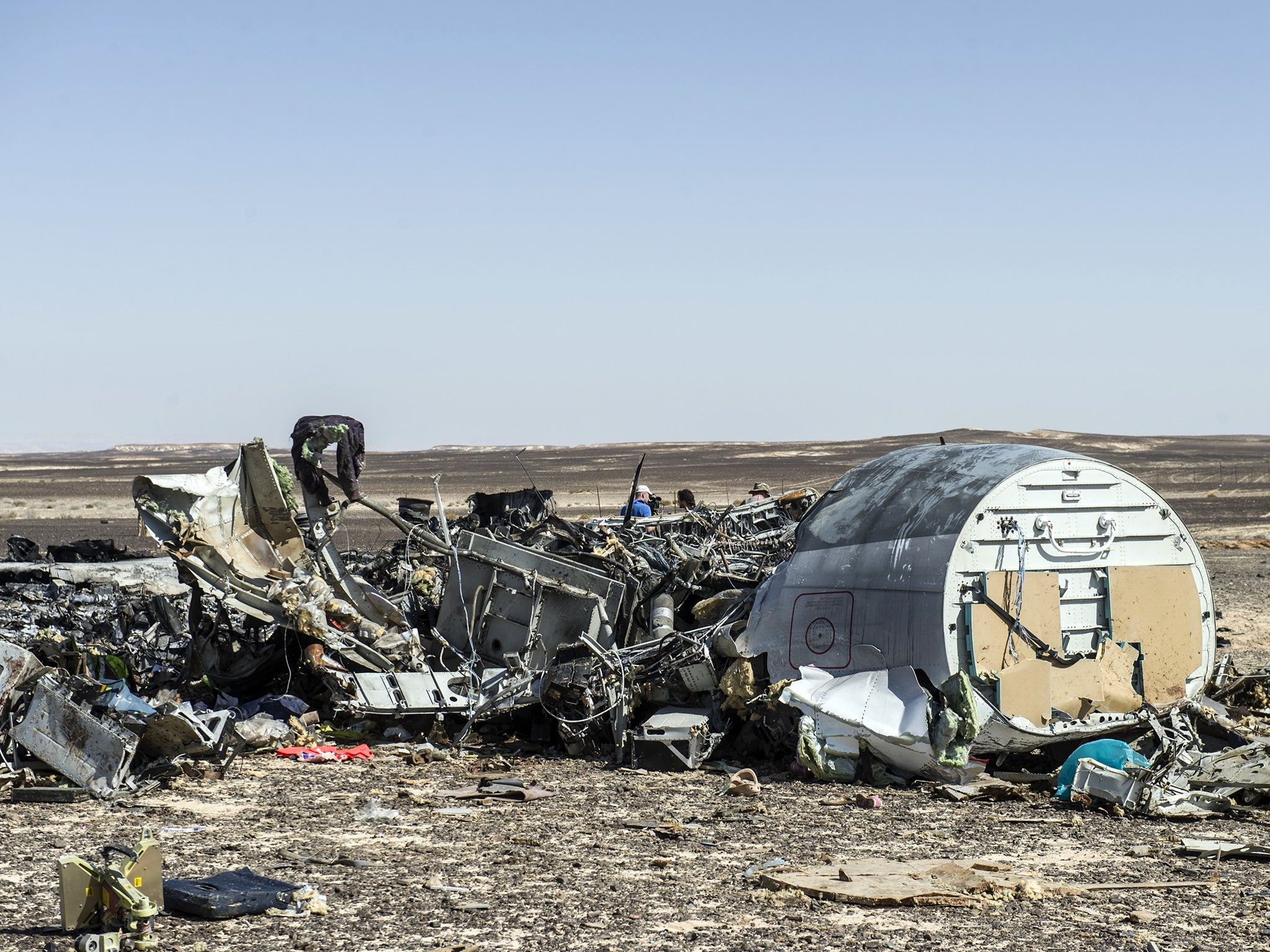Russian plane crash Q&A: Why has Russia now confirmed Metrojet flight 9268 was bombed?
Moscow says the cause of the Sinai desert crash was an improvised explosive device containing up to 1kg of TNT

On Saturday 31 October, 224 people died when their Metrojet charter flight from Sharm el Sheikh in Egypt to St Petersburg in Russia crashed in the Sinai desert. Five days later, the UK government took the unprecedented step of banning British airlines from flying from the Red Sea airport until a team of security experts is satisfied with the standards in place. Now, Russia says the cause of the crash was an improvised explosive device containing up to 1kg of TNT. But there are still many questions about the tragedy and its effects.
Russian passenger plane crashes in Egypt
Show all 20Q What have the Russians said?
The assertion about a bomb emerged from a meeting late on Monday 16 November between the Russian President, Vladimir Putin and Alexander Bortnikov, director of the nation’s Federal Security Service. Mr Bortnikov said: “Mr President, we have studied the passengers’ personal belongings and luggage and fragments of the plane that crashed in Egypt on October 31. An expert examination of all these objects has found traces of foreign-made explosives. According to our experts, a self-made explosive device equivalent up to 1 kg of TNT was set off on board, which explains why the fragments of the aircraft were scattered over a large area. We can say with confidence that this was a terrorist act.”
Q Now that the Russians have confirmed the plane was bombed, is that effectively the end of the investigation?
Far from it. International aviation rules make it clear that the body responsible for the investigation is Egypt’s Aircraft Accident Investigation Central Directorate. Russia is represented in the investigation, as is France (where the plane was designed) and Ireland (home of the leasing company that owned it). It is highly irregular for parties other than the lead investigators formally to ascribe the cause of a crash.
Q So why has Russia done this?
One reason could be to try to provide certainty to the grieving relatives of the victims. But Vladimir Putin’s response was to say air strikes in Syria would intensify, “so as to make it clear to the criminals that vengeance is inevitable”. This tragedy is tangled with Russian politics.
Q But don’t the British and the Americans also believe it was bombed?
Yes, just days after the crash, UK and US intelligence agencies strongly suggested that a bomb had brought down the jet; an “insider threat” attack. So strong was the belief that an IED was planted on board at the airport that the British government banned UK airlines for flying to Sharm el Sheikh except for carefully controlled “rescue flights”. The Foreign Office says: “There’s a significant possibility that the crash was caused by an explosive device. As a precautionary measure, we are now advising against all but essential travel by air to or from Sharm el Sheikh.”
Q Are there any other possible causes?
Until the Egyptian investigators produce proof of the bomb theory, presumably in the shape of traces of explosives in the wreckage, other theories continue to be plausible. Some have speculated that the aircraft's pressure bulkhead, part of the system that seals the cabin from the much lower outside pressure, may have failed. The aircraft operator insists the A321 was properly maintained. However, freely available records show that the aircraft lost on Saturday had encountered structural damage while flying for Middle East Airlines in 2001. The tail struck the runway while landing at Cairo.
Q When will we know more?
The investigators will now be under even more pressure to reveal more of their findings, which could take place within days.
Q Meanwhile, what’s happening to flights to and from Sharm el Sheikh?
The last rescue flights are operating on Tuesday 17 November. The Department for Transport is working with the airport authorities to try to put in place acceptable standards of security to avoid any repeat. A security team is looking at the passenger-screening process and baggage handling procedures, and assessing the effectiveness of background checks on airport staff.
As a reminder, the Sharm el Sheikh area is deemed to be safe - it’s just the airport that is regarded as unsafe.
Q When will flights start up again?
Also on Tuesday 17 November, Carolyn McCall - chief executive of the largest scheduled airline to Sharm el Sheikh, easyJet - said flights would re-start as soon as the ban was lifted. The Independent understands that it is likely to be eased in time for the Christmas/New Year peak season. Meanwhile, airlines and tour operators are cancelling holidays on a rolling basis - giving a week or two’s notice to travellers that they are entitled to a full refund or a replacement holiday.
Subscribe to Independent Premium to bookmark this article
Want to bookmark your favourite articles and stories to read or reference later? Start your Independent Premium subscription today.

Join our commenting forum
Join thought-provoking conversations, follow other Independent readers and see their replies